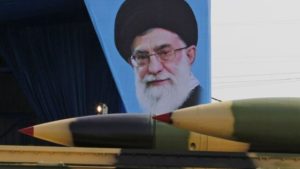Biden gets it wrong on Iran policy
By Rep. John R. Cutis (R-UT) and Khosrow B. Semnani, for The Hill.

Former Vice President Joe Biden is universally respected for his compassion and humanity—a capacity to stand with people in their darkest moments of personal grief and collective suffering.
With the Coronavirus pandemic devastating the Iranian people, Biden has made the question of providing humanitarian relief to the Iranian people a test of American leadership. In an April 2 statement critical of the Trump administration’s maximum pressure Iran policy, he said:
“It makes no sense, in a global health crisis, to compound that failure with cruelty by inhibiting [Iran’s] access to needed humanitarian assistance. Whatever our profound differences with the Iranian government, we should support the Iranian people.”
Sadly, Biden’s idea of American leadership, while rooted in compassion for the Iranian people, contains the seeds of capitulation before the Iranian regime. His mischaracterization of U.S. intentions and interests feeds and fuels the anti-American narrative adopted by Iran’s revolutionaries since the hostage crisis of 1979. Such rhetoric only serves the interests of China, Russia and other powers—not the American and Iranian people. Instead of puncturing the fundamentalist myth of the United States as the Great Satan, Biden resurrects it.
As Biden himself concedes—and Secretary of State Mike Pompeo and Special Representative for Iran Brian Hook affirm—there are already humanitarian exemptions to American sanctions. If Biden can work with the Trump administration to guarantee the flow of humanitarian assistance to the Iranian people that is more than welcome. But blaming the crisis in Iran on Republicans, even if it is out of compassion for the Iranian people, ignores the real elephant in the room: Ayatollah Ali Khamenei.
As Iran’s supreme leader, Khamenei has usurped his station as a cleric to claim that he derives his sovereign powers from God. As the guardian of religious dogma, he also denies the authority of scientific facts. His dismissal of the COVID-19 outbreak as a hoax turned Iran’s shrine cities—Qum and Mashad—into a vortex for infecting countless Shi’a pilgrims. As if contaminating Iran and the Middle East were not enough, Khamenei dismissed the pandemic to boost turn-out in Iran’s parliamentary elections. After exposing Qum and much of Iran to protect the Islamic Revolutionary Guard Corps’s special relationship with China, Khamenei now blames the United States for conspiring to infect the Iranian people. His legendary hypocrisy, now manifest in wide-spread blight, is why Iranians exposed to the coronavirus have greeted the Persian New Year with the hashtag “Khameneivirus.”
Over the past four decades, while Khamenei and his collaborators have siphoned off hundreds of billions of dollars from Iran’s vast oil wealth, 57 million Iranians—over 60 percent of the population—have been pushed below the poverty line. It is this impoverished population that erupted in protest across Iran in response to gas price hikes in November. In response, the Ayatollah adopted a shoot-to-kill policy against demonstrators, the injured were denied medical care, the dead funerals. Such structural violence is not due to sanctions or to the virus. No, they are the symptoms of a sick and failing state overseen by a corrupt regime.
In 2009, following the Ayatollah’s crackdown on pro-democracy protesters, Vice President Biden himself read the writing on the wall. Iran’s leaders, he said, are “sowing the seeds of their own destruction,” adding, “The Iranian people [they’re] thinking about regime change.” Yet, instead of standing by Iranians in their struggle for free and fair elections, the Obama administration chose to strike a nuclear deal with Khamenei’s henchmen.
Remarkably, after lambasting the Trump administration for its cruelty and inhumanity, Biden touts the status quo ante—the return to yet another nuclear deal—that will prolong Khamenei’s rule and the Iranian people’s anguish.
If it is the humanity of the Iranian people that we seek to defend, then let us direct our compassion to the inhumanity in Evin prison, where Iran’s leading women’s rights activist Nasrin Sotoudeh is currently on a hunger strike demanding freedom for political prisoners amidst the COVID-19 outbreak. Sotoudeh, and countless other champions of democracy are denied medicines and sanitary supplies. They are not only deliberately exposed to COVID-19 but to a deadlier pathogen: Khamenei’s evil.
It is time to stop vilifying America for the sins of a theocracy founded on fraud, fear, and force. The only vaccine that can put an end to the pandemic devouring the body and destroying the soul of Iran is democracy. The relief the Iranian people seek is the end to clerical rule: the establishment of a constitution that places sovereignty where it has always belonged—in the heart and hands of the Iranian nation.
John R. Curtis is a member of Congress who represents Utah’s 3rd District and serves on the House Foreign Affairs Committee. Khosrow B. Semnani is an Iranian-American industrialist, community leader and philanthropist based in Salt Lake City, Utah, and author of “The Ayatollah’s Nuclear Gamble: The Human Cost of Military Strikes Against Iran’s Nuclear Facilities” and “Where Is My Oil? Corruption in Iran’s Oil and Gas Sector.”



